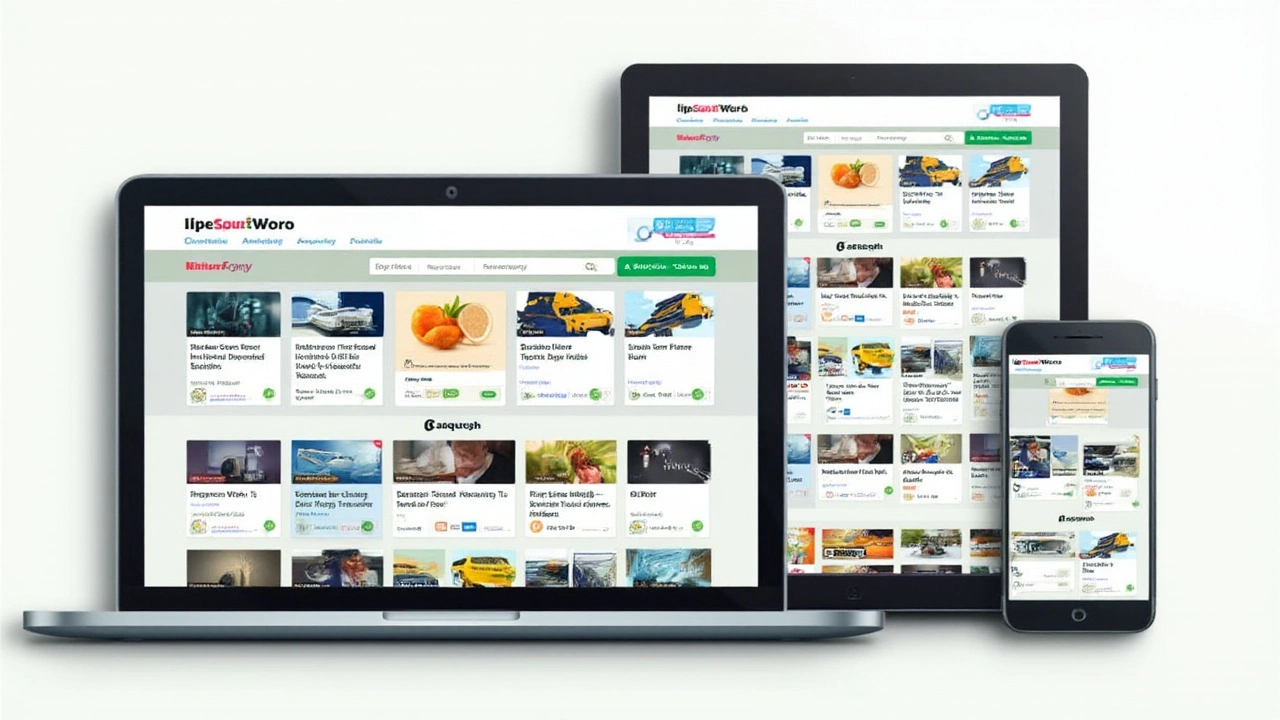
Exploring the Top E-Learning Platforms of 2025
The digital age has ushered in a revolution in the way we learn. No longer confined to the traditional classroom, education now spans the globe, accessible from the comfort of our homes or on the go. This shift has birthed a plethora of e-learning platforms, each vying to be the go-to option for learners of all ages and backgrounds.
These platforms range from those offering courses on niche topics to expansive databases covering vast disciplinary areas. The popularity of e-learning continues to grow due to its flexible nature and ability to cater to individual learning styles and paces. As we explore the leading platforms of 2025, we delve into their unique offerings, advantages, and the cutting-edge innovations they employ to keep learners engaged and motivated.
- Rise of E-Learning
- Top Platforms of 2025
- Features That Make a Platform Stand Out
- Future Trends in Online Education
Rise of E-Learning
The advent of the internet revolutionized the way we access information, and education was no exception. Once bound by geographical and temporal constraints, learning has now expanded beyond borders, thanks to the surge in e-learning. This boom started in earnest at the dawn of the 21st century, driven by rapid technological advancements and the escalating need for continuous learning in professional and personal lives. The accessibility of online courses has made learning more inclusive, offering individuals in remote areas opportunities to study subjects that were once beyond their reach.
During the past decade, the development of online courses has accelerated, helping millions acquire new skills without the limitations of traditional classroom settings. The global pandemic in 2020 became a significant catalyst, making digital education not just an option but a necessity. Educational institutions worldwide had to transition almost overnight to online teaching. This abrupt shift underscored the importance of robust, user-friendly digital platforms capable of delivering high-quality education and interactive learning experiences.
Today, e-learning platforms offer a wide range of features, from video lectures and live sessions to discussion forums and automated assessments. These platforms have incorporated advanced technologies like AI and gamification to make learning engaging and personalized. In fact, a study from 2022 revealed that e-learning reduces learning time by 40-60% compared to traditional methods while increasing retention rates by a staggering 25-60%. The flexibility of these platforms allows students to learn at their own pace, revisiting complex topics without pressure.
The World Economic Forum emphasized that the future of jobs lies in digital and technological skills, making e-learning an essential pathway for staying competitive in the ever-evolving job market.
Notably, some platforms have gained recognition for their innovative approaches. Coursera, for instance, offers courses from world-renowned universities, while Udemy empowers experts to share their knowledge globally. Meanwhile, LinkedIn Learning has been instrumental for professionals seeking to boost specific skills for career advancement. These platforms vary in their structures, some offering self-paced courses, others following schedules like traditional classes. This diversity accommodates different learning preferences, ensuring that anyone can find a suitable platform for their educational journey.
The rise of e-learning coincides with the increasing importance of continual skill development in response to technological advances and the labor market's demands. It reflects a shift in educational philosophy, where learning is no longer confined to the young or early career stages. Today's e-learning pioneers are equipping people across different life stages with the ability to adapt and thrive in a digital-first world. As more people recognize the value of lifelong learning, the expansion of digital education is set to continue, paving the way toward a more informed, skilled, and dynamic global workforce.

Top Platforms of 2025
As we venture into 2025, the world of e-learning is teeming with platforms each striving to outshine the other by offering a range of valuable features and content. Coursera, founded in 2012, remains one of the front-runners in this arena. It collaborates with top universities and companies to deliver courses on a broad spectrum of subjects, enabling learners to gain university-accredited certifications right from the comfort of their own homes. This extensive library of courses attracts learners looking to boost their online courses credentials without the geographic restrictions of traditional education.
Not far behind is Udacity, a platform famous for its so-called Nanodegree programs. It has carved a niche in the tech industry by partnering with leading technology companies to design projects that mimic real-world challenges. These programs focus on the most in-demand skills such as AI, machine learning, and data analysis. The success of Udacity lies in its ability to match learners with industry-specific programs aimed at bridging the gap between academia and industry demands.
"Udacity's Nanodegree programs have revolutionized the way tech enthusiasts perceive online education, providing them with practical skills necessary for the industry," said TechCrunch in a 2024 review article.
Another notable platform, edX, co-founded by Harvard University and MIT, continuously pushes the boundaries of digital learning. Known for offering courses and full programs from top-tier universities, edX serves a global audience including both casual learners and those seeking advanced degrees. As education becomes increasingly globalized, edX stands out by offering multilingual courses that erase cultural and linguistic barriers, enhancing accessibility in the digital learning space.
When considering platforms for personal or professional growth, we cannot omit Skillshare, a unique player focused on creativity and entrepreneurship. With its community-focused approach, Skillshare invites professionals to share their expertise through video courses and projects. This peer-inspired learning model resonates strongly with hobbyists and creators, nurturing a culture of collective knowledge exchange. Skillshare's emphasis on interactive projects ensures learners are active participants, benefiting from hands-on experience rather than passive content consumption.
Lastly, LinkedIn Learning solidifies its position as a favorite among professionals. Integrating with the vast networking opportunities present on LinkedIn, the platform offers courses that focus on career development. Learners appreciate its ability to suggest courses based on their career paths and industry trends, a feature that makes learning more relevant and targeted. This targeted approach enhances employability, attracting professionals seeking to enhance their resumes and stay competitive in their fields.
The landscape of e-learning platforms is dynamic, adapting to the evolving needs of learners and the technological progress of the education sector. Many platforms are increasingly adopting AI to customize learning experiences and enhance student engagement. As we look ahead, the future of e-learning appears brighter than ever, with these top platforms leading us into an era where lifelong learning becomes the norm rather than the exception.

Features That Make a Platform Stand Out
Choosing the right e-learning platform can make a significant difference in a learner's educational journey. While content is king, the delivery of that content through the platform is just as vital. A standout e-learning platform typically boasts user-friendly navigation, ensuring learners can easily find their way around courses, modules, and assignments. Visual appeal can't be ignored either; a platform needs a clean and engaging interface that attracts and retains users' attention. An interesting trend is the integration of gamification elements, turning the learning experience into an interactive journey where users can earn points, badges, and even climb leaderboards as they progress. This engagement is crucial for maintaining motivation and long-term commitment.
Besides aesthetics and navigability, the adaptability of the content is also crucial. An effective platform must accommodate diverse learning styles by offering a mix of videos, quizzes, discussion forums, and live webinars. This not only caters to the varied preferences of learners but also reinforces the material through multiple formats, leading to better retention and understanding. Online courses benefit greatly from interactive content, which actively involves the learner in their educational process, leading to more profound and lasting knowledge gains. Many platforms also offer adaptive learning technologies that personalize content delivery based on individual progress and performance, further enhancing the learning experience.
Another pillar that elevates a platform is the reliability and accessibility of its resources. Learners should be able to access courses anytime, anywhere, making mobile compatibility a non-negotiable feature. Platforms that fail to prioritize seamless integration across devices may find themselves at a disadvantage. In a world that's increasingly mobile-first, being able to pick up lessons on a smartphone during a commute is a key selling point. Moreover, robust technical support is essential. Users must feel assured that any issues will be resolved swiftly, allowing them to focus solely on learning.
The icing on the cake is the availability of recognized certifications and accreditations. For many learners, the ultimate goal is professional development and career advancement. Platforms that partner with prestigious institutions or industry leaders to offer certifications provide substantial added value. These credentials lend credibility and weight to the skills acquired, facilitating career progression.
"Recognition from a respected authority can be the catalyst that propels a learner's career to new heights," says a spokesperson from the International Society for Technology in Education. This underscores the importance of the platform's reputation and its collaborations in enhancing learners' employment prospects.
Finally, cloud-based data security features can set a platform apart. In a digital age rife with concerns about data privacy and security breaches, ensuring the protection of personal information is critical. A trusted platform will implement advanced security protocols, giving learners peace of mind as they engage in online education. By keeping these features at the forefront, e-learning platforms not only ensure an excellent user experience but also position themselves as leaders in the flourishing digital learning landscape.

Future Trends in Online Education
The world of e-learning is on the brink of transformation with several trends that promise to redefine how knowledge is imparted and absorbed. As technology advances at an unprecedented pace, many educational platforms are seeking to embed emerging technologies into their systems. One such monumental shift is the integration of Artificial Intelligence (AI) to create personalized learning paths. AI has the capability to analyze a learner's performance in real-time, offering tailored content that aligns with individual learning curves. This not only enhances the learning experience but also ensures optimal knowledge retention by adapting to the learner's specific needs.
Another dominant trend is the rise of Micro-Learning. With attention spans shortening and the demand for quick, actionable learning methods, platforms are now offering bite-sized content that can be consumed in mere minutes. This approach aligns perfectly with the busy schedules of today's professionals and students, who prefer learning modules that can be completed during a commute or in short breaks. Besides, visual and interactive content has become a cornerstone of modern e-learning, as platforms endeavor to engage users through video tutorials, gamified learning experiences, and virtual reality environments. Embracing these, learners find themselves more immersed in the material, leading to higher engagement levels and satisfaction.
The expansion of Massive Open Online Courses, or MOOCs, also reflects trends shaping contemporary digital education. As these platforms offer courses from prestigious universities and institutions globally, the accessibility of high-quality education is no longer a constraint, enabling learners to bridge geographical and financial barriers. This democratization of education is a harbinger of a more educated and capable global populace. There is a noticeable shift towards skills-based learning as well, as platforms increasingly align their course offerings with job market demands, helping learners acquire competencies that are directly applicable to industry standards.
"Online learning is not the next big thing, it is the now big thing," said Donna J. Abernathy, pointing to the timely relevance and needed adaptability of modern education systems to emerging technologies.
Finally, the emphasis on data analytics in education technology cannot be understated. By leveraging analytics, platforms can provide insights into both student performance and the effectiveness of their content. This closed feedback loop not only improves the course delivery but also empowers educators with the information needed to refine their teaching methodologies. As we stand on the cusp of this educational evolution, it is clear that the future is bright, with digital learning positioned at the forefront of innovative educational solutions. As these trends continue to unfold, the impact on the global learning landscape will undoubtedly be both profound and transformative.






Write a comment